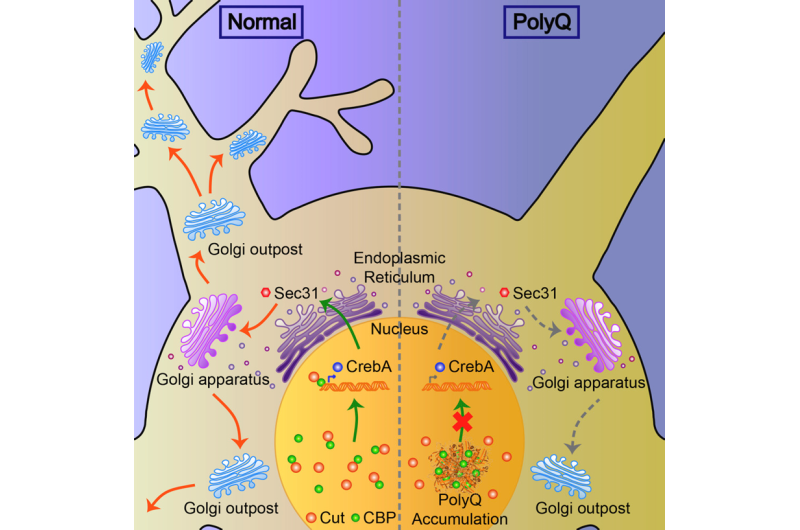Dendritic Golgi as key cause of degenerative brain disease

A joint research team of DGIST (Daegu Gyeongbuk Institute of Science and Technology) has identified the early neuropathic mechanism of polyglutamine brain disease, one of the representative degenerative brain diseases. They team's findings could accelerate the development of early neuropathy treatment for a variety of degenerative brain diseases, including dementia, Parkinson's disease and Lou Gehrig's disease, which are commonly known to be caused by toxic proteins.
The elderly population has grown with the advancement of medical technology. In Korea, one in 10 elderly people aged 65 or older in recent years suffers from dementia. With the increasing number of patients suffering from intractable degenerative brain disease, many studies have sought the development of therapeutic agents.
Unfortunately, the patients who seek doctors for treatment of degenerative brain diseases are likely already to have significant damage to brain cells and it is difficult to expect an effective recovery via commercially available therapeutic agents. Therefore, it is essential to understand how degenerative brain disease progresses in the early stage.
The research teams led by Professor Sung Bae Lee and Professor Daehee Hwang have verified for the first time that dendritic-specific Golgi, a cellular organelle in neurons, plays a key role in the early neuropathy of degenerative brain disease.
In a model of degenerative brain diseases caused by polyglutamine toxic protein such as Huntington's chorea and spinal cord cerebellar degeneration, the research teams found that the deformation or abnormality of dendritic-specific Golgi, which play a key role in the cell membrane of brain cells, is the major cause of degenerative brain disease leading to morphological transformation of neuronal cells.
The study has demonstrated that the early neuropathy of diseased brain cells can be restored by inducing overexpression of the CrebA gene, a newly discovered key factor in pathology. In addition, by identifying the transcription factors involved in the early neuropathy caused by toxic proteins such as CrebA and high-level factor CBP, the researchers have suggested that they could be new subjects to develop therapeutic agents for degenerative brain diseases.
DGIST Professor Sung Bae Lee said, "We have verified that the dendrite-specific Golgi of brain cells play a core role in the early neuropathy of degenerative brain disease. By restoring the early stages of the disease, we expect to accelerate the development of therapeutic drugs that can effectively treat degenerative brain diseases."
This study has been published in the online edition of Cell Reports, an international journal of life science and the sister journal of Cell, on July 11.
More information: Chang Geon Chung et al, Golgi Outpost Synthesis Impaired by Toxic Polyglutamine Proteins Contributes to Dendritic Pathology in Neurons, Cell Reports (2017). DOI: 10.1016/j.celrep.2017.06.059


















